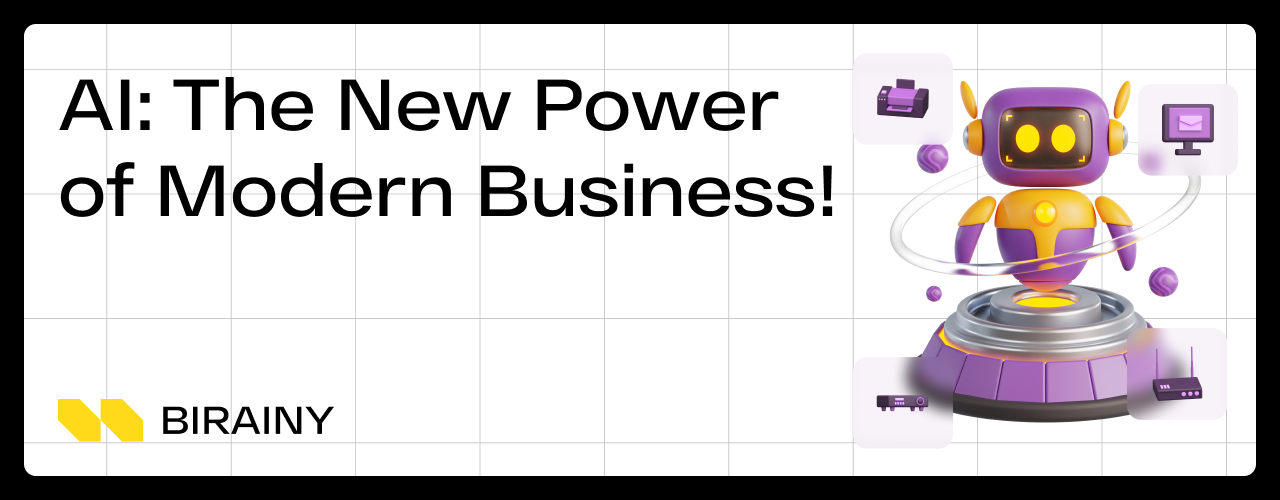The New Era of Artificial Intelligence in the Business World
07 March 2025

The New Era of Artificial Intelligence in the Business World
AI is a field of science dedicated to creating computer systems that mimic human intelligence functions. In recent years, Artificial Intelligence (AI) has rapidly advanced, bringing revolutionary changes to the business world.
This technology offers businesses unique opportunities to increase efficiency, reduce costs, and enhance customer experience. Let’s take a closer look at the role of artificial intelligence in the business world.
Modern businesses gain a competitive advantage and optimize their operations by leveraging the capabilities of artificial intelligence.
How Does Artificial Intelligence Impact Businesses?
Our world is evolving rapidly, and technological advancements enable us to carry out processes faster, more efficiently, and at lower costs.
Artificial intelligence (AI) helps automate business processes, allowing tasks to be managed more effectively and flexibly.
Imagine having to review documents for hours, respond to customer inquiries, and analyze vast amounts of data simultaneously. Sounds exhausting, doesn’t it? But the good news is that artificial intelligence (AI) can now handle these complex and time-consuming tasks on our behalf!
What used to take hours can now be completed in seconds with AI. For example, answering customer questions, verifying documents, analyzing data, and even managing production processes have become much easier thanks to AI.
Banks, insurance companies, and large corporations already use this technology to automatically review documents, process customer requests, and conduct analyses.
Moreover, customer satisfaction plays a crucial role. People want convenient and high-quality service, and companies aim to keep customers engaged by ensuring satisfaction. This is where artificial intelligence (AI) plays a significant role.
AI makes customer service more transparent and personalized. Simply put, technology understands customer behavior and helps businesses better meet their needs.
Additionally, AI tools analyze customer interests and provide tailored recommendations. For example, if you shop online, AI can suggest products based on your previous preferences. This saves you time and increases sales opportunities for companies.
In short, AI will both automate your business processes to minimize costs and offer your customers a better and more personalized experience.
The Role of AI in Software Development and Data Analytics
We have highlighted the critical role of Artificial Intelligence in various industries. Now, let’s examine its significance in two distinct fields: Data Analytics and Software Development.
Programming used to rely entirely on human creativity and expertise. However, artificial intelligence now assists programmers, making their work more efficient. AI-powered tools like GitHub Copilot and Tabnine predict and complete code as programmers write.
On the other hand, AI can automatically detect errors. For example, if you are writing a project in Python and make a syntax error, AI-powered tools can immediately identify the mistake and even suggest how to fix it.
Data analytics is a field that helps analyze vast amounts of data to make informed decisions. In the past, people manually analyzed data, which was time-consuming. Now, AI accelerates this process and provides more accurate results.
With AI and machine learning technologies, data can now be analyzed in real time, trends can be identified, and potential risks can be predicted in advance. Furthermore, AI simplifies data visualization.
In the future, AI will continue to advance in these fields, making technology more accessible and valuable. If you work in business or technology, utilizing AI's capabilities will save you both time and resources.
AI in Various Industries and Sectors
Artificial intelligence (AI) is no longer confined to the technology sector; it is also transforming numerous industries.
The financial sector is one of the areas where large volumes of data are processed at high speeds. AI is used here to reduce risks and make smarter investment decisions.
- Smarter Investment Strategies – AI analyzes investment markets, assesses risks, and provides more accurate predictions.
- Personal Financial Management – AI-powered financial applications automatically track budgets, analyze expenses, and offer savings recommendations.
The e-commerce sector is one of the industries that extensively utilizes artificial intelligence. AI analyzes customer behavior, provides personalized recommendations, and optimizes the sales process.
For example, AI suggests products tailored to your preferences, making shopping easier. Smart chatbots answer your questions 24/7. AI regulates inventory and pricing, creating convenience for both sellers and buyers.
Future Perspectives of Artificial Intelligence
As we can see, Artificial Intelligence (AI) is rapidly evolving and has become a necessity rather than a choice for businesses.
Companies must adapt to these changes, maximize the opportunities AI provides, and keep up with future trends. However, they must also be prepared for the new challenges that AI presents. Businesses should consider AI as a strategic partner and adopt a flexible approach.
- Proactive Customer Analysis – AI delivers personalized and data-driven services.
- Strategic Decision-Making – Artificial intelligence processes vast amounts of data to provide more precise business decisions.
- Human-AI Collaboration – AI automates routine processes, enhancing human potential.
- Security and Ethics – Data privacy, transparency, and user trust must be maintained.
To summarize, AI is no longer the technology of the future—it is the technology of today. Those who know how to use it will become more agile, competitive, and successful. Now the question is: Are you ready for this transformation?
